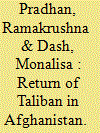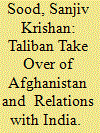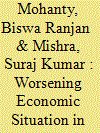|
|
|
Sort Order |
|
|
|
Items / Page
|
|
|
|
|
|
|
| Srl | Item |
| 1 |
ID:
185119


|
|
|
|
|
| Summary/Abstract |
Afghanistan’s quest for political change from a monarchical state to a modern state got jeopardized in the mid-1970s, partially due to the tribal nature of society and partially because of the intervention of global powers and regional powers in its internal affairs. Its geographic location, Cold War politics, and Global War on Terror (GWOT) invited the intervention of global powers and regional powers in the politics of Afghanistan, which complicated its process of political transition. The United States (US) and the former Soviet Union (SU) had failed to facilitate the establishment of a modern, inclusive, representative, and legitimate state order in Afghanistan. Global and regional politics adversely affected the process of political change in Afghanistan and also adversely affected by the perennial political turmoil characterized by extremism, terrorism, and radicalization there. The US entry to fight GWOT in Afghanistan following 9/11 happenings led to the fall of the Taliban regime. In contrast, the US exit from Afghanistan following Doha Deal resulted in the Taliban Regime’s re-emergence in August 2021.
|
|
|
|
|
|
|
|
|
|
|
|
|
|
|
|
| 2 |
ID:
185129


|
|
|
|
|
| Summary/Abstract |
The Modi government has shown that it can “look beyond dogma,” whether it is through a willingness to use force in Pakistan; to build stronger relations with the Middle East; to capture Trump’s imagination; to recognize Europe’s importance in times of changing geopolitics; to embrace the fact that technology is central to international relations; or to rewire India’s position within Asia.
|
|
|
|
|
|
|
|
|
|
|
|
|
|
|
|
| 3 |
ID:
185132


|
|
|
|
|
| Summary/Abstract |
The foreign policy of a nation is primarily determined by its national interest. India, in its foreign policy objective, tries to peruse an environment that suits its national interests. Undeniably, the underlying principles of its foreign policy is world peace, prosperity and establishment of a just, fair and ruled based world order. For India, the innermost circle of its foreign policy is Asia in general and its neighborhood pivotal. It was quite evident from Jawahar Lal Nehru’s Pan-Asianism approach. To him, India’s independence marked the rise of Asia. In fact, South Asia is India’s immediate neighborhood, from the geopolitical point of view it always remains as the core of India’s security.
|
|
|
|
|
|
|
|
|
|
|
|
|
|
|
|
| 4 |
ID:
185120


|
|
|
|
|
| Summary/Abstract |
Despite the odds the best policy for India is to continue its engagement with the Taliban as well as international negotiations on Afghanistan. India needs a” degree of stability and security “for engagement in Afghanistan. Strategic and economic interests apart a strong, independent and politically stable Afghanistan is essential for stability ,security and prosperity of the region in a highly interdependent globalised world.
|
|
|
|
|
|
|
|
|
|
|
|
|
|
|
|
| 5 |
ID:
185128


|
|
|
|
|
| Summary/Abstract |
India’s special relationship with the Soviet Union and the logic of Cold War politics led India to take a neutral stance on Soviet intervention, which harmed India’s image among Afghans and the West. The Taliban era (1996–2001) was the lowest point in India-Afghanistan relations. The rise of the Karzai regime provided an opportunity for India to re-establish ties with Afghanistan.
|
|
|
|
|
|
|
|
|
|
|
|
|
|
|
|
| 6 |
ID:
185126


|
|
|
|
|
| Summary/Abstract |
Today the Afghans are aware that change is indeed possible: technological progress, women’s empowerment, infrastructural growth, and education. The Taliban regime will be hard-pressed to fulfill these goals. The situation in Afghanistan, after the fall of Kabul to the Taliban, remains uncertain. The international response to the crisis in Afghanistan should prioritise development cooperation. India needs to ponder its engagement with Afghanistan, with full consideration of the emerging political and geoeconomic realities in the region.
|
|
|
|
|
|
|
|
|
|
|
|
|
|
|
|
| 7 |
ID:
185136


|
|
|
|
|
| Summary/Abstract |
“Every relation in international politics is based on the power and interest” this is once again proved by the US after President Joe Biden order asking Pentagon to withdraw the U.S troops from Afghanistan in April by Sept.11, eventually ending America’s longest war. U.S was well aware of the fact that Taliban will capture Kabul as soon as they will withdraw their troops from Afghanistan. The reason behind this act in my opinion are as; US 9/11 attack burst the strong emotional feeling of Americans.
|
|
|
|
|
|
|
|
|
|
|
|
|
|
|
|
| 8 |
ID:
185131


|
|
|
|
|
| Summary/Abstract |
The Taliban takeover of Afghanistan in August 2021 can be treated as the most recent significant diplomatic and strategic setback for India. The Taliban’s ascendance forced India to undertake a hasty evacuation of its security and diplomatic personnel stationed in Afghanistan. Essentially, India severed diplomatic ties with Afghanistan. The Taliban takeover nullified India’s decades-long presence in Afghanistan. Can India afford to lose the goodwill it has earned in Afghanistan by not engaging with the Taliban? Or, should India take decisive steps in opening channels of communications with the ruling regime in Afghanistan so as to salvage a semblance of strategic presence. This paper argues that India’s policy of not engaging with the Taliban prior to the latterbecoming the de-facto government in Afghanistan was strategically myopic. New Delhi must not waste any more time in establishing meaningful contacts with the Taliban so that the positives of two decade-long engagement with Afghanistan are sustained and carried forward.
|
|
|
|
|
|
|
|
|
|
|
|
|
|
|
|
| 9 |
ID:
185127


|
|
|
|
|
| Summary/Abstract |
A massive geopolitical churning taking place in Afghanistan will have its unprecedented implications for the South Asian region including India. Those who were concerned that the democratically elected government led by Ashraf Ghani was bad must be confirmed by now that Taliban is worst as its return has bleed the heart of Asia like never before. Although, the regime reverses in Afghanistan is a Talibani message to America but its return in many ways is a serious cause of concern for South Asia and especially India considering the history of Afghanistan and character of Taliban.
|
|
|
|
|
|
|
|
|
|
|
|
|
|
|
|
| 10 |
ID:
185124


|
|
|
|
|
| Summary/Abstract |
This paper is a humble attempt to look into the strategic importance of USA and other power in the context of existing situation in Afghanistan. Historically since the cold-war era, Afghanistan has remained as a troubled state, primarily due to its strategic location and the intervention of the super power to use its soil for military and strategic purpose. As a result of which, it embroiled in various types of experiments, giving rise to Talibanism. In the current scenario, once Taliban taken the control over it and as USA has already withdrawn from its soil, it’s going to be very problematic, in terms of strategic point. Hence this paper is an attempt to examine the interest of other powers along with USA, and the role they can play in the context of Afghanistan.
|
|
|
|
|
|
|
|
|
|
|
|
|
|
|
|
| 11 |
ID:
185118


|
|
|
|
|
| Summary/Abstract |
Considering China’s recent engagement with the Taliban regarding China’s security concerns, as well as the possibility of Afghanistan’s participation in the BRI via the extension of CPEC to Afghanistan, it appears that there is a significant likelihood of extending CPEC to Afghanistan. This raises a number of questions. How is the new Taliban version distinct from its previous model? Has the Taliban changed its position on issues like women’s rights and support for terrorist organisations? How much would the new Taliban play into Pakistan’s hands, undermining the interests of various countries in the region, including India? The answers to these questions will provide vital insight into how the CPEC expansion may impact the region.
|
|
|
|
|
|
|
|
|
|
|
|
|
|
|
|
| 12 |
ID:
185130


|
|
|
|
|
| Summary/Abstract |
For over two decades the fires of war destroyed most of Afghanistan. With hope, resilience, caring, and access to modern education; Afghan people had a chance to uplift their country from the ashes and regain the legacy of their forefathers and they did but after the Taliban regime and their policies on girl’s higher education is a very important matter that Taliban are constantly trying to make decisions and making it unlikely that women will be able to pursue careers and engage in public life.
|
|
|
|
|
|
|
|
|
|
|
|
|
|
|
|
| 13 |
ID:
185134


|
|
|
|
|
| Summary/Abstract |
This paper tries to examine the strategic role India can play considering its strategic location and the current trends in global politics. Historically Afghanistan has remained as a troubled state for number of reasons and there are issues related to mis-governance, lack of stable regimes, lack of proper law & order situation, however in the current scenario, India has great role to play there. The aftermath of USA withdrawal and take over by Taliban to rule Afghanistan, has automatically created the space for India to move strategically to increase its influence over Afghanistan to South Asia as a whole. In that background, this paper tries to examine the critical role India can play.
|
|
|
|
|
|
|
|
|
|
|
|
|
|
|
|
| 14 |
ID:
185122


|
|
|
|
|
| Summary/Abstract |
The fall of Afghanistan to Taliban forces on 15 August, 2022 was not surprising as they have been encircling Kabul ever since the US signed troop withdrawal deal with Taliban in February, 2020. But, its speed and quickness was surprising as Taliban captured Kabul even before the US could withdraw its functionaries and citizens from Afghanistan. The political and strategic vacuum created by the withdrawal of US forces attracted the attention of China and Russia. The Taliban has received active political and other forms of support from Pakistan ever since the Taliban I regime was removed by US forces in 2001. Thus, Pakistan has considerable lever age over the formation of the Taliban II regime in Afghanistan.
|
|
|
|
|
|
|
|
|
|
|
|
|
|
|
|
| 15 |
ID:
185135


|
|
|
|
|
| Summary/Abstract |
In any case, China is unlikely to provide an alternative to US and western funding. Moreover, given China’s global history of unfavorable commercial and financial agreements, Chinese involvement would be a potential source of both opportunity and risk for Afghanistan.It is a mutually beneficial relationship.After 20 years, the Taliban-II is better positioned to provide the minimum levels of security and stability for infrastructure investment in the country.
|
|
|
|
|
|
|
|
|
|
|
|
|
|
|
|
| 16 |
ID:
185125


|
|
|
|
|
| Summary/Abstract |
The Taliban Government in Afghanistan is a fait accompli. India has traditional relations with people of Afghanistan and it is in our national interest to help rebuild the war ravaged country irrespective of official recognition to the Taliban Government.
|
|
|
|
|
|
|
|
|
|
|
|
|
|
|
|
| 17 |
ID:
185123


|
|
|
|
|
| Summary/Abstract |
Afghanistan is and will continue to be vital to India’s strategic interests in the region. It is the only SAARC nation where majority of people love India and Indians. American exit and Taliban takeover is certainly a huge strategic setback for India in the region in different ways as discussed above. Undoubtedly, India now is reworking its game in Afghanistan. Diplomatically its stakes, are very high, and is work in progress.
|
|
|
|
|
|
|
|
|
|
|
|
|
|
|
|
| 18 |
ID:
185121


|
|
|
|
|
| Summary/Abstract |
Anticipating India’s role in Afghanistan from the Soviet invasion to the U.S. withdrawal, Washington realized that it needs to appraise New Delhi’s views on regional as well as global issues. The present paper seeks to understand the context in which the decisions taken by the United States to withdraw from Afghanistan impacted rest of the world especially India. Does Taliban II pose any threat to only six countries that share border with Afghanistan or even to the extended neighbours.Paper will examine Indian policy and the diplomatic behaviour in Afghanistan since it is within the broader framework of the American global policy. It intends to examine the present and futuristic venture of Taliban II together with its implication on neighbourhood.
|
|
|
|
|
|
|
|
|
|
|
|
|
|
|
|
| 19 |
ID:
185133


|
|
|
|
|
| Summary/Abstract |
A month after the Biden Administration pulled U.S forces out of Afghanistan, only seventeen per cent of the country’s more than twenty-three hundred health clinics were functional. Doctors in the hospital in Kabul told that they hadn’t been paid since the Taliban seized power, in August, and that medicine is in short supply. The new government is struggling to feed the country’s thirty-nine million people, and the chance that an Afghan baby will go hungry and die is the highest in twenty years. Half of the country’s population needs humanitarian assistance to survive, double the number from 2020. More than twenty million people are on the brink of famine.
|
|
|
|
|
|
|
|
|
|
|
|
|
|
|
|
|
|
|
|
|